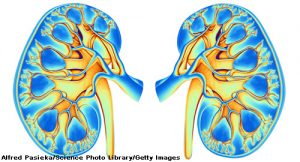 Voclosporin, a novel calcineurin inhibitor, reduces the activation of T cells and stabilizes podocytes, thereby reducing proteinuria. In late January, the U.S. Food & Drug Administration (FDA) approved voclosporin to treat adults with lupus nephritis, making it the first FDA-approved oral therapy for lupus nephritis available in the U.S.
Voclosporin, a novel calcineurin inhibitor, reduces the activation of T cells and stabilizes podocytes, thereby reducing proteinuria. In late January, the U.S. Food & Drug Administration (FDA) approved voclosporin to treat adults with lupus nephritis, making it the first FDA-approved oral therapy for lupus nephritis available in the U.S.
The treatment has a consistent dose-concentration relationship, so patients don’t need to undergo therapeutic drug monitoring. Also, it has an advantage over other drugs in its class because it has an improved lipid and glucose profile and no drug-drug interaction with mycophenolate mofetil (MMF).
Although rheumatologists have heard about the benefits of voclosporin at past scientific meetings, the results of the AURORA 1 trial were not published until May 9 in The Lancet.1 The data come from the largest lupus nephritis clinical program to date, and the drug label includes much of the data from the publication. In the study, investigators report treatment with voclosporin in combination with MMF and low-dose steroids led to a clinically and statistically superior complete renal response rate when compared with MMF and low-dose steroids alone. Brad H. Rovin, MD, a nephrologist at the Ohio State University Wexler Medical Center, Columbus, and colleagues found the two treatment regimens had comparable safety profiles and concluded their findings represent an important advancement in the treatment of patients with active lupus nephritis.
The study describes how the addition of 23.7 mg of oral voclosporin twice daily increased complete renal response by 26% in the phase 2 Aurinia Urinary Protein Reduction Active—Lupus with Voclosporin (AURA-LV) trial and 18% in phase 3 AURORA 1 at one-year of treatment.2 The AURORA 1 study documented complete remission rates of 41%, with an odds ratio of 2.65 relative to placebo.
The extension study: Presented at the virtual EULAR 2021, June 2–5, the results from the interim analysis of the ongoing AURORA 2 extension study indicate that after two years of continued treatment, patients taking voclosporin maintain meaningful reductions in proteinuria, with no change in their mean estimated glomerular filtration rate (eGFR).3 The extension study documented a change in the urine protein/creatinine ratio from pre-treatment baseline to year 2 of -3.1 mg/mg for the voclosporin group and -2.1 mg/mg for the control group (P=0.0004).
Overall, patients experienced a small, early and expected decrease in mean eGFR in the voclosporin group in the first four weeks of treatment in AURORA 1, after which eGFR remained stable for two years. The researchers saw no unexpected adverse events in the AURORA 2 extension study and, thus, conclude the most recent data support a positive risk/benefit profile of voclosporin.
Speed of Remission Is Key
Robert Huizinga, PhD, RN, executive vice president of research at Aurinia Pharmaceuticals and corresponding author of The Lancet article emphasized the speed of remission in patients treated with voclosporin, which was twice that observed in the control group. Such remission should prevent ongoing, long-term kidney damage.
“We are pretty excited by that data,” says Dr. Huizinga. “The sooner you have a primary flare, the longer you are damaging your kidney.”
According to Dr. Huizinga, some rheumatologists consider this ability to treat patients quickly to be a revolution. “You don’t have to wait 52 or 104 weeks to get to remission,” says Dr. Huizinga. “That should, hopefully, keep patients’ kidneys from getting further damaged.”
Moreover, because the FDA indication for voclosporin is for active lupus nephritis and not a specified level of proteinuria, rheumatologists can use their clinical insights to prescribe it. “The FDA has given clinicians some flexibility in using [the treatment],” says Dr. Huizinga.
Dr. Huizinga underscores the benefits of accomplishing remission without therapeutic drug monitoring. “The rheumatologist office is crowded and busy, and the last thing you want to do is complicate your life by looking at extra labs,” says Dr. Huizinga. For all these reasons, Dr. Huizinga says researchers are starting to see rheumatologists prescribing voclosporin. “It makes sense immunologically, and it also makes sense clinically,” he concludes.
Lara C. Pullen, PhD, is a medical writer based in the Chicago area.
References
- Rovin BH, Onno Teng YK, Ginzler EM, et al. Efficacy and safety of voclosporin versus placebo for lupus nephritis (AURORA 1): a double-blind, randomised, multicentre, placebo-controlled, phase 3 trial. Lancet. 2021. 397(10289):2070–2080.
- Rovin BH, Solomons N, Pendergraft WF, et al. A randomized, controlled double-blind study comparing the efficacy and safety of dose-ranging voclosporin with placebo in achieving remission in patients with active lupus nephritis. Kidney Int. 2019 Jan;95(1):219–231.
- Saxena A, P Mina-Osorio p, C Mela, and V Birardi. Voclosporin for lupus nephritis: Interim analysis of the AURORA 2 extension study [POS0681]. EULAR Virtual Congress. 2021 Jun 2–5.


